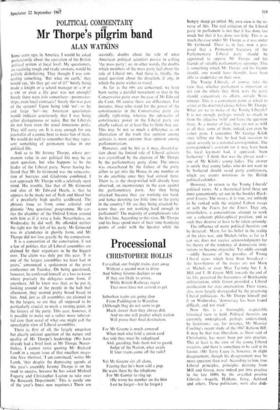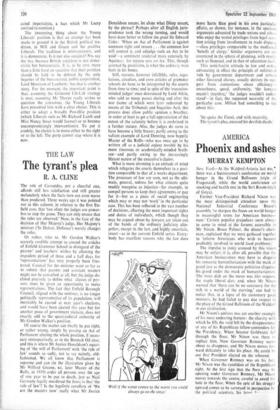Mr Thorpe's pilgrim band
POLITICAL. COMMENTARY ALAN WATKINS
Some years ago, in America, I would be asked perfunctorily about the operation of the British political system at local level. My questioners, on receiving rough and ready answers, would be politely disbelieving. They thought I was con- cealing something. `But what on earth,' they would say, `do they get out of it?' Surely being made a knight or a school manager or a to or a cm or even a life peer was not enough? Surely there were jobs somewhere—postmaster- ships, even local contracts? Surely this was part of the system? Upon being told `no'—or by and large `no'—my American questioners would indicate courteously that I was being either disingenuous or naïve. But the Liberals do not have even the usual innocuous perks. They still carry on. It is easy enough for any journalist of a comic bent to make fun of them. We would do well to remember that they repre- sent something of permanent value in -our political life.
And so to Mr Jeremy Thorpe, whose per- manent value in our political life may be an open question, but who happens to be the leader of the Liberal party. Never having be- . lieved that Mr Jo Grimond was the reincarna- tion of Socrates and Gladstone combined, I can approach Mr Thorpe with a relatively open mind. His trouble, like that of Mr Grimond and also of Mr Edward Heath, is that he appears to be made not of flesh and blood but of a peculiarly high quality cardboard. The phrases issue as from some celestial and platonic `Any questions' programme. He car- ries the chamber of the Oxford Union around with him as if it were a halo. Nevertheless, on Wednesday he did well. He offended neither the right nor the left of his party. Mr Grimond was in attendance in ghostly form, and Mr Thorpe did not lose greatly by the comparison.
It is a convention of the constitution, if not a law of politics, that all Liberal assemblies are claimed by their organisers to be the biggest ever. The claim was duly put this year. 'It is one of the largest assemblies we have had in years,' announced a spokesman at the press conference on Tuesday. On being questioned, however, he confessed himself at a loss to know where precisely the delegates came from, if anywhere. All he knew was that, as he put it, looking around at the people in the hall that afternoon, they seemed pretty broad based to him. And, just as all assemblies are claimed to be the largest, so are they all supposed to be particularly crucial, to mark a turning point, in the history of the party. This year, however, it is possible to.make out a rather more substan- tial case than usual of what one might call the apocalyptic view of Liberal assemblies.
There is, first of all, the largely unspoken but clearly existent question of the nature and quality of Mr Thorpe's leadership. (We have already had a brief look at Mr Thorpe. Never- theless, I cannot resist quoting Mr Richard Lame; in a recent issue of that excellent maga- zine New Outlook. 'I am convinced,' writes Mr Lamb, `that despite the depressing agenda_ at this year's assembly Jeremy Thorpe is on the road to success, because he has asked Michael Fogarty and Christopher Layton to take over the Research Department.' This is surely one of the year's finest non sequiturs.) There are secondly, doubts about the role of what American political scientists persist in calling `the mass party'; or, in other, words, the doubts which members of the mass party feel about the role of Liberal MPS. And there is, thirdly, the usual question about the direction, if any, in which the party wishes to travel.
As far as the mos are concerned, we have been seeing a parallel movement to that in the Conservative party over the case of Mr Edward du Cann. Of course there are differences. For instance, those who stand for the power of the constituencies in the Conservative party are chiefly right-wing, whereas the advocates of constituency power in the Liberal party are chiefly radical, or at least like to think they are. This may be not so much a difference as an ilhistration of the truth that opinion among activists is more extreme than opinion among parliamentarians.
However, and be this as it may, dissatisfac- tion about the limited role of Liberal activists was crystallised by the election of Mr Thorpe by the parliamentary party alone. The unrest Was exacerbated by the failure of the party either to get into the House in any number or to do anything once they had arrived there. There is, as the sharp-witted will already have observed, an inconsistency in the case against the parliamentary party. Are they being attacked because they are working too hard, and hence devoting too little time to the party in the country? Or are they being attacked be- cause they are not working hard enough in parliament? The majority of complainants take the first line. According to this view, Mr Thorpe and his boys spend most of their time bandying points of order with the Speaker while the hungry sheep go unfed. My own view is the re- verse of this. The real criticism of the Liberal party in parliament is not .that it has done too much but that it has done too little. This is as much the case under Mr Thorpe as it was under Mr Grimond. There is. in fact, now a pro- posal that a Permanent Secretary of' the Parliamentary Liberal party should be appointed to apprise Mr Thorpe and his friends of suitable parliamentary openings. This is something which Mr Thorpe and his friends should, one would have thought, have been able to undertake on their own.
The Young Liberals, of course, take the view that, whether parliament is important or not (on the whole they think not), the party should concentrate its efforts outside West- minster. This is a convenient point at which to arrive at the doctrinal choice before Mr Thorpe. What are we to make of the Young Liberals? It is not enough. perhaps. merely to attach to them the adjective 'wild' and leave the question there. As a matter of fact, they are not as wild as all that: some of them. indeed, can even be rather prim. 1 remember Mr George Kiloh once telling me that he had had occasion..to speak severely to a national correspondent. The correspondent's assistant (or it may have been his local leg-man) had, it appeared. 'been bothering'-1 think that was the phrase used— one of Mr Kiloh's young ladies. The answer is surely that young ladies who do not want to be bothered should avoid party conferences, which are events notorious in the British political calendar.
However, to return to the Young Liberals' political views. At a theoretical level these are most conveniently set out in the booklet Black- pool Essays. The essays, it is true, arc unlikely to be ranked with the original Fabian essays or with the Tracts for the Times. They are, nevertheless, a conscientious attempt to work out a coherent philosophical position; and as such they deserve at least to be taken seriously.
The influence of many political theorists can be detected: Marx, for his belief in the reality of the class war, and Michels (who, as far as I can see, does not receive acknowledgment) for his theory of the tendency of democratic insti- tutions to become oligarchic. Yet oddly enough —oddly because of the parodies of Young Liberal views which have been broadcast— the hero-figures of the essays are not Mirk or Michels or even Mao Tse-tung but J. S. Mill and T. H. Green. Mill, towards the end of his life, perceived the barrenness of Benthamite utilitarianism, while Green provided a Liberal justification for state intervention. Their views, alas, were largely disregarded by the practising liberal politicians. As Mr Thorpe himself put it on Wednesday, 'democracy has been found difficult, and not tried.'
Now this is a thoroughly respectable historical view to hold. Political theorists are currently underplayed, perhaps undervalued, by historians: see, for instance, Mr Maurice Cowling's recent study of the 1867 Reform Bill. It may be that true liberalism, as Shaw said of Christianity, has never been put into practice. This at least is the view of the young Liberal essayists, and there is something to be said in its favour. (Mr Terry Lacey is, however, in slight disagreement, though his disagreement may be more apparent than real. According to him, true Liberal principles, principles deriving from Mill and Green, were indeed put into practice in the late 1880s by the so-called positive riberats—Asquith, Haldane, Grey, Ackland and others. These politicians, were also dedi-
cated imperialists, a fact which Mr Lacey omitted to mention.)
The interesting thing about the Young Liberals' position is that an attempt has been made to ground it in the British political tra- dition, in Mill and Green and the positive Liberals. The tradition is interventionist, and it is democratic. Is it not also socialist? No, say the vt.s, because British socialism is not demo- cratic but bureaucratic. It is, to be sure, more than a little hard on socialists that their position should be held to be defined by the only begetter of the bureaucratic public corporation, Lord Morrison of Lambeth : but that is another story. For the moment, the important point is that, assuming the Grimond Lib-Lab strategy is over, assuming Mr Thorpe really wishes to question the consensus, the Young liberals have presented him with a clear choice. This is either to adopt a broadly Powellite position (which Liberals such as Mr Richard Lamb and Miss Nancy Seear would favour) or to become uncompromisingly interventionist. To put it crudely, the choice is to move either to the right or to the left. The party cannot stay where it is DOW.



































 Previous page
Previous page